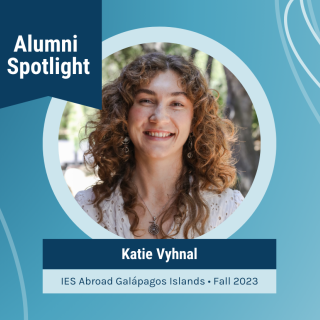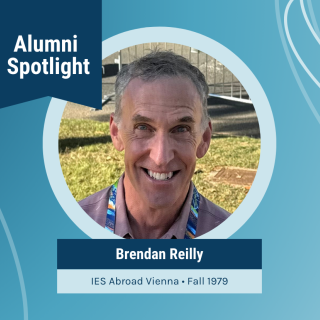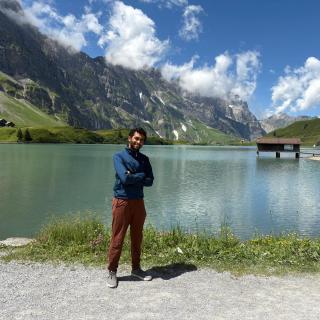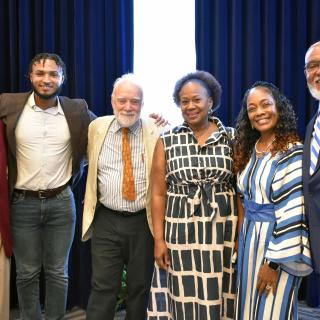 Alexandra ‘Sandi’ Curry (Vienna 1977-78) moved frequently as a child, living in Canada, the United States, and various parts of Asia. She studied abroad as a way to reconnect with her family’s Austrian roots in an academic setting, and then went on to pursue a career in finance and real estate. She was always fascinated by the story of Chinese legend Sai Jinhua, who traveled from East to West as a concubine to one of China’s earliest emissaries to Europe. Sandi had such a strong connection to Sai’s story that she felt compelled to bring her story to Western audiences with her debut novel, The Courtesan, published last month.
Alexandra ‘Sandi’ Curry (Vienna 1977-78) moved frequently as a child, living in Canada, the United States, and various parts of Asia. She studied abroad as a way to reconnect with her family’s Austrian roots in an academic setting, and then went on to pursue a career in finance and real estate. She was always fascinated by the story of Chinese legend Sai Jinhua, who traveled from East to West as a concubine to one of China’s earliest emissaries to Europe. Sandi had such a strong connection to Sai’s story that she felt compelled to bring her story to Western audiences with her debut novel, The Courtesan, published last month.
In our interview, Sandi shares her unlikely path to becoming a novelist and why Part Four is set in the Palais Kinsky (former home of the IES Abroad Vienna Center).
IES Abroad: Why did you choose to study abroad in Vienna?
Sandi Curry: My story might be atypical in that, for me, the study abroad experience was less about exploring new places than about returning to a place that had been one of few constants in my life. My mother is Austrian and grew up in Lower Austria and Vienna, and as a result, I had traveled there regularly. Throughout my childhood, my family moved and traveled frequently. It was a peripatetic upbringing, and IES Abroad presented a way for me to deepen my attachments to family heritage and reestablish my sense of being connected to a long-familiar place. I was able to continue my U.S.-based education with the fine academic program while regaining my footing in a familiar environment after my years in Asia and then the States. As it turned out, I learned a lot about both myself and about Austria and Vienna in a much broader context than my earlier, more family-oriented stays had previously allowed. It was great.
IES Abroad: What were some of your most memorable study abroad experiences?
SC: My most memorable experiences came from travel, in particular a trip I took to Greece and Egypt with five other IES Abroad students. Our entourage was five women, including me, and Kevin Curry, who tolerated us (barely) on a 19-hour train ride from Vienna to Athens in a tiny railway compartment. We later went on to Egypt, where Kevin—poor guy—shepherded the five of us up and down the pyramids, through crowded bazaars, onto mob-scene buses, and generally protected us as best he could from the groping hands of Egyptian men. I ended up marrying Kevin, and we have been married now for 33 years!
IES Abroad: At a young age, you moved with your family to Singapore. Did this background influence your approach to studying abroad in Vienna?
SC: In a way it did, in that my Asian experiences profoundly colored the way I saw the world at the time—and they still do. The ways in which the Asian cultures, the American, and the European/Austrian differed, each from the other, crystalized for me during that year. I think that coming back to Vienna for an extended period of time was very important for me personally to find ways to think about each of these environments that were very much a part of me culturally and experientially and to realize that this would always be a piece of who I am. I think that this is an aspect of the study abroad experience that applies to most people who take six months or a year to live somewhere that is culturally different—there is a perspective that colors who you become for the rest of your life.
IES Abroad: What career path did you take you after graduating?
SC: After leaving Wellesley College, I went to New York City to work for Chase Manhattan Bank as a commercial banker. I later did financial work for several companies, raised two children, and with my husband, acquired a portfolio of real estate investments that kept me busy for a time. My latest career move—the most interesting and the one with the sharpest change of direction—has led me to become, against all odds, a novelist.
IES Abroad: You just published your debut novel, The Courtesan. What motivated you to switch course and take up writing? How did you prepare?
 SC: Really the primary motivation was my fascination with the story of Sai Jinhua. I had never written fiction before and had never thought of writing, but I wanted to tell her story; I knew it was good and had a right to be told to Western readers—and my family was supportive, which mattered greatly. As for preparation, I began with research. I read everything I could find about Sai Jinhua, about the politics of her period, about women in Chinese society, about the Boxer Rebellion, foot binding, Chinese dress, and story-telling. I read as many first-hand accounts dating to the 19th century as I could find. I studied old photographs and maps. Traveled to Suzhou and there, entirely by accident, found the house where Sai Jinhua lived with her diplomat husband.
SC: Really the primary motivation was my fascination with the story of Sai Jinhua. I had never written fiction before and had never thought of writing, but I wanted to tell her story; I knew it was good and had a right to be told to Western readers—and my family was supportive, which mattered greatly. As for preparation, I began with research. I read everything I could find about Sai Jinhua, about the politics of her period, about women in Chinese society, about the Boxer Rebellion, foot binding, Chinese dress, and story-telling. I read as many first-hand accounts dating to the 19th century as I could find. I studied old photographs and maps. Traveled to Suzhou and there, entirely by accident, found the house where Sai Jinhua lived with her diplomat husband.
The research was ongoing until the very end of writing the book. There was also the very significant matter of learning how to write fiction. So I attended a couple of writing workshops and participated in several writers’ critique groups. I was lucky enough to find people who were supportive, who themselves knew how to write, were willing to share—and most important of all—who asked great questions. I learned a lot from them.
IES Abroad: Tell us about your novel. What inspired you to tell the story of the Chinese legend Sai Jinhua?
SC: The book is the story of a real person, a Chinese courtesan, who is very well known in China. Sai Jinhua’s fame dates to the last decades of the nineteenth century when she became the concubine of a man who was one of China’s earliest emissaries to Europe. She traveled with him to Berlin where they lived for about three years, although I have taken poetic license with the story and situated them in Vienna. Sai Jinhua’s greatest renown stems from the legend of her romance while in Europe with a Prussian military officer, a count, who later played a decisive role in the aftermath of the Boxer Rebellion in Peking.
As to why I wanted to tell this story, I was a young girl when my family moved to Singapore, which was and still is a fascinating multi-cultural place with a population of Chinese, Malay, Indian, and “other” people. Arriving there gave me the thrill of my life. It was exotic and loud and pungent and delicious—and also hugely alienating at first. People everywhere—all with faces not like mine. On hearing the story of Sai Jinhua’s travel to Europe, I remembered all of this. And I wondered—what was it like for a young woman (one hundred years earlier) to leave her home in China and go to a Europe that was strange and disorienting and fabulous—where people all had faces not like hers? So this was the genesis. My own journey, in a way, but, of course, for Jinhua the journey was from East to West and back, while mine was the reverse.
IES Abroad: Part Four of the novel is called ‘Palais Kinsky’ and is set in Vienna. How did you draw upon your study abroad experience when writing this section?
SC: Once I had made the decision to “relocate” Jinhua and her husband from Berlin to Vienna, I needed to give them a specific environment. This was particularly important for Jinhua because as a Chinese woman of her era, the tradition was for her to remain very much within the confines of the household (or in China the women’s quarters). The Palais Kinsky was a place I knew intimately, having studied there with IES Abroad—and it was also in historical terms a reasonable location for a diplomatic mission. As it happens, I later found out that the Chinese embassy was actually located in the Kinsky for a few years during the early 20th century. So my study abroad experience gave me the gift of intimacy with what turned out to be a key location for the book, which I have come to think of as part of the amazing symmetry of life.
IES Abroad: Have you been back to Vienna since studying abroad? What has changed?
SC: Oh yes, I go back regularly. I am, in fact, in Vienna right now! Vienna has moved with the times. The city has become much less culturally conservative; the formality of the city has been tempered. You are now allowed to walk and sit on the grass in the public parks; you are “allowed” to wear shorts in the city, jeans to the opera, and Vienna actually has a very “hip” side. It is also more global, more open-minded, more multi-cultural in its complexion. For example, Vienna is coping with tens of thousands of refugees fleeing war in the Middle East, and there is a large grass roots effort underway at the Hauptbahnhof to help, as well as government and church sponsored efforts. I should also mention a couple of things that have not changed. The Palais Kinsky is still standing, but underwent a major renovation/restoration in the 1990s, and is now home to an auction house, events facilities, shops, and restaurants.
IES Abroad: Do you have any advice you would give to students who are thinking of studying or interning abroad?
SC: Absolutely. I would say think about history. It matters and is amazing. Talk to the people you meet and ask lots of questions. Travel boldly and often. Keep your eyes and your mind open. Allow the experience to change who you are.




